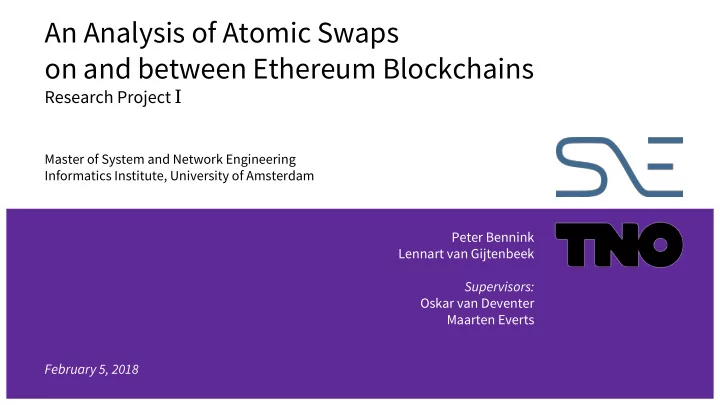

An Analysis of Atomic Swaps on and between Ethereum Blockchains Research Project I Master of System and Network Engineering Informatics Institute, University of Amsterdam Peter Bennink Lennart van Gijtenbeek Supervisors: Oskar van Deventer Maarten Everts February 5, 2018
Centralized cryptocurrency exchanges - Transactions via the exchange - Exchanges hold funds - SPOF (wallet database) - Hacks and disappearances - Untrustworthy trusted third party 2
Atomic swaps “A transaction between two parties that does not depend on a third party, for - More decentralized process instance a centralized exchange, and - Less dependence on either happens in full, or not at all.” (centralized) third parties - Less chance of loss of funds 3
Are there reliable methods for making atomic swaps on and between blockchains? 4
Ethereum - TNO Techruption blockchain - Ethereum Classic (ETC) & Quorum - Mining process similar to Bitcoin (PoW) - Smart contracts 5
Smart contracts - Programs stored on the blockchain - Solidity - Static and open-source code - Gas costs - Executed by miners to verify - Tokens are implemented using smart contracts 6
ERC-20 Token Standard - Homogeneity - Smoother integration with crypto software. - Requires the implementation of the ERC-20 interface - Return total supply - Keep track of wallet balances - Transfer tokens - Allowances 7
Types of atomic 1. Single-chain token swaps 2. Single-chain coin/token swaps swaps 3. Cross-chain coin swaps 4. Cross-chain token swaps 5. Cross-chain coin/token swaps 8
1. Single-chain token swap 1.5 EOS Wallet Wallet Client Client A B 1 OMG 9
2. Single-chain token/coin swap 100 EOS Wallet Wallet Client Client A B 1 ETH 10
3. Cross-chain coin swap 1 ETH Wallet Wallet A B Client Client Wallet Wallet A B 40 ETC 11
4. Cross-chain token swap 1 VeChain Wallet Wallet A B Client Client Wallet Wallet A B 30 InPay 12
5. Cross-chain token/coin swap 2.5 EOS Wallet Wallet A B Client Client Wallet Wallet A B 1 ETC 13
1. Single-chain token swaps Types of atomic 2. Single-chain coin/token swaps swaps 3. Cross-chain coin swaps 4. Cross-chain token swaps 5. Cross-chain coin/token swaps 6. Single-chain coin swaps 14
Design & implementation - Single usage swap contracts - Transaction via the contract - Rinkeby & Ropsten test networks - Hashed TimeLocked Contract (HTLC) - Compatible with all ERC-20 tokens 15
Cross-chain coin swap 16
Why is this atomic? - If client A does not claim their function claim(string _secret) public returns (bool) { if (hashed_secret == sha256(_secret) && funds, client B cannot either now < timeOut){ - If client A claims, they reveal the selfdestruct(clientB); } else { secret to client B, who can then return false; } can also claim their funds } 17
Single-chain token swap 18
Why is this atomic? function claim() onlyParticipant public returns (bool) { uint token1_balance = token1_instance.balanceOf(this); uint token2_balance = token2_instance.balanceOf(this); - When claim() is called the contract if (token2_balance >= amountOf_token2 && token1_balance >= amountOf_token1 && now < timeOut) { is in full control of the funds token1_instance.transfer(clientB, token1_balance); token2_instance.transfer(clientA, token2_balance); selfdestruct(clientA); } else { return false; } } 19
Reusable - Indefinitely and concurrently contracts - Scales better - No deployment costs 20
Reusable single-chain token swap 21
Conclusion Future research - Reusability - Other blockchains - Off-chain - Reliable swaps are possible - Decentralized exchanges (use cases) - Investigate attack vectors Project git repository: 22 github.com/clvang000/SNE_TNO_RP1
Questions . . . Project git repository: 23 github.com/clvang000/SNE_TNO_RP1
Recommend
More recommend